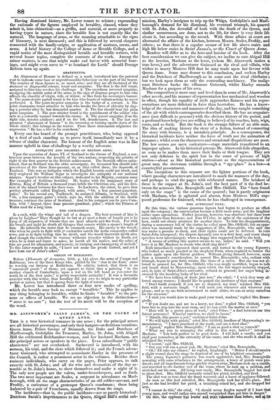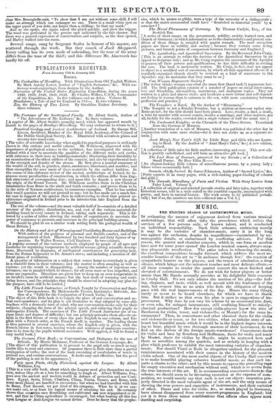MR. AINSWORTH ' S SAINT JAMES'S, OR THE COURT OF QUEEN ANNE.
IBIS is a true historical romance in one sense ; for the principal actors are all historical personages, and only their hangers-on fictitious creations. Queen Anne, Prince George of Denmark, the Duke and Dutchess of Marlborough, Godolphin the Treasurer, Harley, St. John, with Abigail Hill the celebrated Bedchamber-woman, and her husband Masham, are the principal actors or speakers in the piece. Even subordinate " public characters' are not overlooked. Sacheverel is introduced, with his sermon, his trial, and the riots which followed it; and the French adven- turer Guiscard, who attempted to assassinate Harley in the presence of the Council, is rather a prominent actor in the volumes. Besides these eminent individuals, who carry on the pages, Prior appears, to talk smartly with St. John ; and all the wits and dramatists of the day as- semble at St. John's house, to show themselves and make a night of it. The only new people are the valets, under-housekeepers, and so forth. The two most important are Scales, a sergeant in attendance on Marl- borough, with all the stage characteristics of an old soldier-servant, and ?noddy, a caricature of a grotesque Queen's coachman; these being balanced by a pair of Frenchmen, equally drawn from the stage. The incidents—that is, the public incidents—are as purely historical : Dutchess Sarah's imperiousness to the Queen, Abigail Hill's artful sub- mission, Harley's intrigues to trip up the Whigs, Godolphin's and Marl borough's demand for his dismissal, his eventual triumph, his quarrel with St. John, the downfall of both with the death of the Queen, and similar occurrences, are done, not to the life, for there is very little life about it, but according to the record. With these affairs at court are alternated the affairs of the kitchen, between Messrs. Scales, Proddy, and others ; so that there is a regular seesaw of low life above stairs and high life below stairs in Saint James's, or the Court of Queen Anne.
Readers will differ as to the hero and heroine of the book. After the best consideration we can give the subject, we incline to rate Abigail Hill as the heroine, Masham as the lover, (whom Mr. Ainsworth makes a true lover,) and the adventurer Guiscard as the rival and villain, who wishes to marry Mistress Hill that he may trade upon her favour with Queen Anne. Some may demur to this conclusion, and reckon Harley and the Dutchess of Marlborough as in some sort the rival chieftains ; but we look upon them as only the contending machinery. The malig- nant Dutchess backs the villanous Guiscard, whilst Harley seconds Masham for a purpose of his own.
The composition is more easy and level than in some of Mr. Ainaworth's other novels, and his manner of representation less mechanical and wooden in effect, though his equality of style approaches flatness and his repre- sentations are more deficient in force than heretofore. He has a know- ledge of the characters and manners of the day, and has caught something of the air with which contemporaries described them. He has an acquaint- ance (not difficult to procure) with the obvious history of the period, and a profound knowledge (we are willing to believe) of its coaches, hats, wigs, coats, and so forth. But the book is the strange failure of an able man. The idea of pinking history the story of a fiction' instead of connecting the story with history, is a mistaken principle. As a consequence, the historical incidents have neither the force of truth nor the animation of romance; whilst even the characters and occasional disquisitions are poor. The low scenes are mere caricature—stage materials transferred to an improper sphere. In his historical persons Mr. Ainsworth fails altogether, as soon as he makes them move their limbs or their tongue. They are not only deficient in the spirit but in the sense of persons of high station—about as like historical portraiture as the representations of great men the showman exhibits through a " spy-glass " in a box—a counterfeit presentment. The exceptions to this censure are the lighter portions of the book, where passing characters are introduced to mark the manners of the day, and perhaps to stud the pages with celebrated names. The briskest of these is the supper at St. John's, and the best part of it the duel be- tween the actresses Mrs. Bracegirdle and Mrs. Oldfield. The "hate found only on the stage " is the cause of the quarrel ; but it partly originates with Masham, who is agitated and absent, from Mistress Hill's sup- posed preference for Guiscard, whom he has challenged in consequence.
THE ACTRESSES' DUEL.
By this time, the various generous liquors had begun to produce an effect upon the company; the conversation became a little more noisy, and the laughter rather more uproarious. Perfect decorum, however, was observed: but there were more talkers than listeners; and Tom D'Urfey, in spite of the assistance of the host, could not obtain attention for another stave. To hide his disappointment, during a momentary lull of the clatter he called upon Mrs. Oldfield; but an oppo- sition was instantly made by the supporters of Mrs. Bracegirdle, who said she was under a promise to them, and their rights could not be deferred. In vain Saint-John interposed; the dispute instantly rose to a fiery heat, and many sharp speeches were interchanged; when a happy idea suggested itself to the host. A means of settling this matter occurs to me, ladies," he said " Will you leave it to Mr. Masham to decide who shall sing first? " Both immediately expressed their assent, and turned to the young Equerry; who looked as much puzzled as the shepherd Paris, when required to bestow the golden apple upon the fairest goddess. Without giving himself, however, more than a moment's consideration, he named Mrs. Bracegirdle; who, radiant with triumph, began to pour forth strains like those of a syren. Bat she was not al- lowed to proceed far, for Mrs. Oldfield, who was deeply mortified, began to talk and laugh aloud to Maym.varing; upon which the fair singer instantly stopped, and, in spite of Saint-John's entreaties, refused to proceed; her anger being in- creased by the insulting looks of her rival. " We have been talking of duels just now," she cried; " I wish they were al- lowed among women: I should like to punish the insolence of that creature." " Don't baulk yourself, if you are so disposed, my dear," rejoined Mrs. Old- field, with a sarcastic laugh. " I will meet you whenever and wherever you please; and as we are both accustomed to male attire, we can so array ourselves for the occasion."
" I wish you would dare to make good your word, madam," replied Mrs. Brace- girdle. " If you doubt me, and are in a hurry, my dear," replied Mrs. Oldfield, " you have but to step into the next room, and we can settle the matter at once." " Here will be a pretty piece of work," cried Prior; " a duel between our two fairest actresses ! Whoever survives, we shall be losers."
" 'Sdeath, this passes a jest," exclaimed Saint-John.
" We will fight with pistols," cried Mrs. Oldfield, heedless of Maynwaring's re- monstrances. " I have practised at the mark, and ant a dead shot."
" Agreed," replied Mrs. Bracegirdle; " I am asgood a shot as yourself."
" What say you to arranging the affair in this way, ladies? " interposed Masham. " You both profess to be good shots. I will hold a canclle, an you shall ..t yourselves at the extremity of the room; and she who snuffs it shall be adju. • the victor."
" I assent," said Mrs. Oldfield. " But you will run a great risk, Mr. lifasham," cried Mrs. Bracegirdle.
" Oh ! I'll take my chance," he replied, laughingly. " Better I should receive a slight wound than the stage be deprived of one of its brightest ornaments." The young Equerry's gallantry was much applauded; and, Mrs. 11racegir' dle assenting will some reluctance to the arrangement, a brace of pistols were pro- duced; and all impediments being quickly cleared away, Masham took up a candle, and marched to the further end of the room, where he took up a position, and stretched out his arm. All being now ready, Mrs. Bracegirdle begged her rival to shoot first. Mrs. Oldfield instantly raised her pistol, levelled, and fired. The shot was so true that the flame wavered; and a burst of applause followed. As soon as this had subsided, Mrs. Bracegirdle took lier rival's place. But just as she had levelled her pistol, a trepibling seized her, and she dropped her " I cannot do this," she cried, s should never fe ve myself if I hurt that young man and would ratter own my vanquAed than put him in danger." On this; the elTlei141 Trile louder an P28113 Yebeinent than before; and si 41
close Mrs. Bracegirdle said, "To show that I am not without some skill, I will make an attempt which can endanger no one. There is a small white spot on the upper panel of yon dobr, not larger than a shilling: be that my mark." And as she spoke, she again raised the pistol quickly, and drew the trigger. The wood was perforated in the precise spot indicated by the fair shooter. But there was a general expression of consternation and surprise, as the door opened, and Harley walked into the room.
Several songs, sung by Sergeant Scales in honour of his master, are scattered through the work. But they smack of Jack Sheppard. Every calling has its own mode of unbending, but the tone of the army differs from the tone of the thief; and this difference Mr. Ainsworth has hardly hit off.



























 Previous page
Previous page